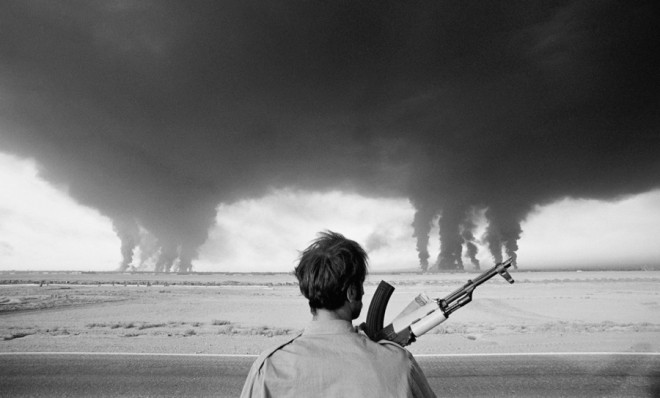How the U.S. helped Saddam Hussein use chemical weapons against Iran
Washington is apparently ready to punish Syria for using poison gas, but a generation ago the calculus was different


A free daily email with the biggest news stories of the day – and the best features from TheWeek.com
You are now subscribed
Your newsletter sign-up was successful
As the Obama administration mulls a military response to punish Syria for allegedly using poison gas to kill hundreds of people in a rebel stronghold, Foreign Policy reports that the U.S. didn't always play the role of the good guy when it came to the use of chemical weapons.
Near the end of Iraq's war with Iran 25 years ago, the U.S., using satellite imagery, warned Iraq that Iranian troops were moving to exploit a hole in its defenses, according to Foreign Policy, citing recently declassified Central Intelligence Agency documents and interviews with former intelligence officials. U.S. officials shared the information with Iraq even though they knew that Saddam Hussein's military was likely to respond by attacking with the lethal nerve agent sarin and other chemical weapons — and he did, killing thousands.
The documents show that then-CIA Director William J. Casey, a close friend of then-President Ronald Reagan, had been told about Saddam's push to make enough mustard gas to keep up with demand on the front lines. "If the Iraqis produce or acquire large new supplies of mustard agent, they almost certainly would use it against Iranian troops and towns near the border," the CIA said in one top secret document.
The Week
Escape your echo chamber. Get the facts behind the news, plus analysis from multiple perspectives.

Sign up for The Week's Free Newsletters
From our morning news briefing to a weekly Good News Newsletter, get the best of The Week delivered directly to your inbox.
From our morning news briefing to a weekly Good News Newsletter, get the best of The Week delivered directly to your inbox.
The new evidence suggests that the Reagan administration decided it was better to let Iraq continue with its attacks — and even point out potential targets — than let the war tip in favor of Iran's mullahs, who at the time were seen as the greater threat. The latest revelations "are tantamount to an official American admission of complicity in some of the most gruesome chemical weapons attacks ever launched," say Shane Harris and Matthew M. Aid at Foreign Policy.
The report fills in some important blanks about the U.S. role in the Iran-Iraq war, but Foreign Policy isn't the first to uncover evidence that Washington had a pretty good idea what Saddam's forces were up to. Here's Max Fisher at The Washington Post:
It's worth noting that academic studies, not to mention U.S. government documents released in 2003, had long ago revealed that the U.S. knew that Iraq was deploying chemical weapons against Iran and still provided Saddam Hussein with intelligence assistance. The CIA documents released this week add important new documentation to that, but the timing of their release — as the U.S. considers whether or how to respond to Syrian chemical weapons use — and their portrayal as revelatory has generated significant controversy in U.S. foreign policy circles. [Washington Post]
However, it does somewhat undercut the Obama administration's claim to higher ground. Conor Friedersorf at The Atlantic:
When humans find themselves greatly empowered, and able to act in secret, they often do morally monstrous things, sometimes with the best of intentions. Part of our job as citizens is to never trust our leaders with that sort of unchecked power, for their sake, for ours, and for the sake of the world. That's easy to see when looking back at the bad behavior of leadership a couple decades ago. But those men were no more or less moral than the people leading us today. [The Atlantic]
A free daily email with the biggest news stories of the day – and the best features from TheWeek.com
Harold Maass is a contributing editor at The Week. He has been writing for The Week since the 2001 debut of the U.S. print edition and served as editor of TheWeek.com when it launched in 2008. Harold started his career as a newspaper reporter in South Florida and Haiti. He has previously worked for a variety of news outlets, including The Miami Herald, ABC News and Fox News, and for several years wrote a daily roundup of financial news for The Week and Yahoo Finance.
-
 How the FCC’s ‘equal time’ rule works
How the FCC’s ‘equal time’ rule worksIn the Spotlight The law is at the heart of the Colbert-CBS conflict
-
 What is the endgame in the DHS shutdown?
What is the endgame in the DHS shutdown?Today’s Big Question Democrats want to rein in ICE’s immigration crackdown
-
 ‘Poor time management isn’t just an inconvenience’
‘Poor time management isn’t just an inconvenience’Instant Opinion Opinion, comment and editorials of the day
